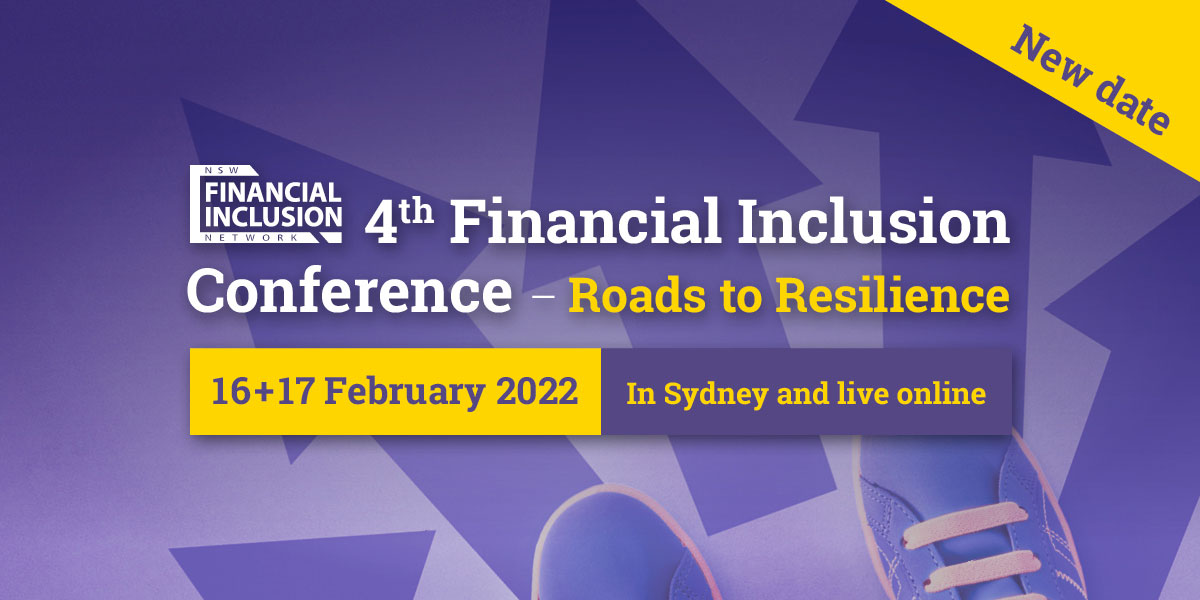4th Financial Inclusion Conference – Roads to Resilience

Call for abstracts are now closed
Thank you for your interest in submitting an abstract for the 4th Financial Inclusion Conference – Roads to Resilience.
Conference themes
There is growing evidence that financial resilience is an important layer for achieving financial inclusion. This conference aims to take a deep dive into financial resilience and explore the various roads to it. Accordingly, conference content will centre around the building blocks of financial resilience, those being:
- Economic resources
- Financial products and services
- Finance knowledge and behaviour
- Social capital
The conference will deepen conversations around these central themes, the development of innovation programs and service delivery. It will showcase current research, findings and celebrate the person-centred approach of NGOs, government initiatives and highlight perceived funding gaps in this sector.
General instructions
The deadline for all submissions is 30 September 2019 to ensure publication requirements are met.
Papers presented at the conference will be considered for publication in collaborating journals. Abstracts will be reviewed on rolling basis with a notification issued within eight weeks after submission. All abstracts will be reviewed by a panel appointed by the conference organising committee. The review panel may contact authors as part of the review process. Successful submissions will be scheduled into new or existing conference sessions.
Review criteria for abstracts include:
- Relevance to the conference topics and theme
- Originality of ideas
- Significance of results
- Application of existing ideas in ways that provide new insights and progress
- Usefulness to audience, clarity and timeliness
Research related abstracts should refer to research that is complete; whilst abstracts that refer to policy or practice should relate to best practice case studies or innovative developments.
The final decision regarding successful submissions will be made by the conference organising committee, following recommendations received from the panel of reviewers. The conference organising committee reserves the right to allocate abstracts into sessions as they see fit in accordance with the overall program objectives.
Conference registration
Acceptance is conditional on registration as a delegate. Presenters must register by 20 December 2019. Abstract presenters will be granted a special speaker registration fee equivalent to the Super Saver registration fee. Speakers will be sent a discount code upon acceptance which will enable full registration at the discounted price. Presenters are responsible for their own travel, accommodation and incidentals in respect to attending the conference.
Key dates
- Call for abstracts open Thursday 25 July 2019
- Call for abstracts close Monday 30 September 2019
- Authors will be notified of outcome via email by Thursday 31 October 2019
- Presenter acceptance deadline Monday 29 November 2019
- Presenter registration closes Friday 20 December 2019
Preparing and formatting an abstract for submission
- Title
-
- Include the full title or topic of your abstract (Max 50 words). This will be used for printing in the final program. The title should be as brief as possible but long enough to indicate clearly the nature of your submission.
-
- Abstract
-
- Please enter an abstract of your paper (Max 250words).
- References are not required. If you wish to include them, they must be included in the body of your text and included in the 250-word count.
- Each paper abstract can be submitted under one theme.
- No changes can be made to the submitted paper abstract after the submission deadline
- No references, tables or graphics should be included in the abstract
-
- Affiliations and authors
-
- Enter the names of all the authors, including yourself if you are an author –in the order in which you wish them to appear in the printed text, and indicating the presenting author
- Please also include the Affiliation/Institution, city and country of each author to ensure the submission is marked as complete. Names omitted here will not be printed in the author index or the final program.
-
- Biography of author/s
-
- A brief biography of the author/s of no more than 90 words including the authors contact details, position, organisation, address, contact numbers and email address
-
- Presentation
-
- Include what type of format would suit your paper best?
- Standard presentation
- Workshop
- It is the responsibility of the author to ensure abstract text does not contain any typos or grammatical errors.
- The Financial Inclusion Network will not be responsible for any errors published.
- Include what type of format would suit your paper best?
-
- Submitting abstracts
-
- Abstracts must be submitted via email to financialinclusion@nrcg.org.au.
- Once you submit your abstract you should receive a confirmation email within 7 days, if you do not please contact Fiona Batterham fiona@nrcg.org.au
-
- Withdraw an abstract
-
- If you wish to withdraw a submission, please contact the Conference office in writing via email to financialinclusion@nrcg.org.au Withdrawals need to be communicated in writing by the author who originally submitted the abstract, and in doing so, the conference office assumes that all other authors/presenters have been informed of the withdrawal
-
- Types of presentations
-
- Paper presentation
- A paper presentation refers to a developed academic topic, policy area, an ongoing project or program evaluation. Paper presentations will represent the majority of submissions accepted for the conference and will have the following characteristics:
- 15-20min duration
- 1 or more presenters
- In a session with up to three other presenters
- Q&A follows all presenters
- A paper presentation refers to a developed academic topic, policy area, an ongoing project or program evaluation. Paper presentations will represent the majority of submissions accepted for the conference and will have the following characteristics:
- Workshop
- A workshop is an opportunity for a group of interested delegates to be engaged in intensive discussion and activity on a particular topic. A workshop can feature educational material with a particular focus on emerging trends, promising practices, applied research and replicable programs. In addition to building new knowledge, workshops can educate delegates on particular skills that can be used in a practical setting such as program management, policy development and organisational leadership. These sessions may be structured in a form of a crafted panel, a dialogue or debate, case studies and interactive activities. A workshop has the following characteristics:
- 90 min duration
- 2 or 3 speakers
- No changes can be made to the submitted workshop submission after the submission deadline.
- A workshop is an opportunity for a group of interested delegates to be engaged in intensive discussion and activity on a particular topic. A workshop can feature educational material with a particular focus on emerging trends, promising practices, applied research and replicable programs. In addition to building new knowledge, workshops can educate delegates on particular skills that can be used in a practical setting such as program management, policy development and organisational leadership. These sessions may be structured in a form of a crafted panel, a dialogue or debate, case studies and interactive activities. A workshop has the following characteristics:
- Paper presentation
-
